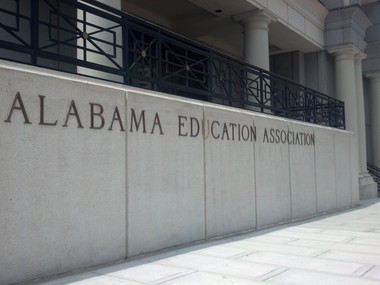Learn
- Alabama's Constitution
- Case for Reform
- Special Interest Groups
- Impact: Elections
- Impact: Legislation
- Impact: Judicial System
The State of Alabama's current constitution was written in 1901. It is the longest constitution in the world with almost 900 amendments. Critics of the document argue that it was poorly written and outdated and that it has provisions that hinder economic development. Extensive efforts have been mounted to bring about a revision of the document. Nevertheless, much disagreement exists as to what would be the best route to take in revising the document. Some want a constitutional convention, while others would like to see the state legislature revise the Constitution on an article by article basis.
It's a Thick Book is a documentary created by Lewis Lehe about the history and present-day issues surrounding Alabama's 1901 Constitution. Complete 3.04 Alabama Constitution 1901 guide as you watch the two segments below.
Watch It's a Thick Book: Local Government (7:21) to learn more about the problems with home rule in Alabama's Constitution.
Watch It's a Thick Book: Taxation (10:36) to learn more about Alabama's taxes and how they are used to fund local and state public services.

On April 7, 2000, the Alabama Citizens for Constitutional Reform (ACCR) was created in Tuscaloosa to educate Alabamians about the problems with the current Alabama Constitution including the lack of input by citizens on local issues, its crippling effect on economic development, and problems with unfair tax burdens on the poor and middle classes. ACCR supports legislation to create a new state constitution.
Read Constitutional Reform by Susan Pace Hamill to learn more about Alabama's Constitution.
Explore Alabama Citizens for Constitutional Reform to learn more about the group's latest efforts for reform.
Read Why We Need a New Constitution from Alabama Citizens for Constitutional Reform. The article summarizes some of the problems with Alabama's current constitution.

Special interest groups are private organizations that attempt to influence public policy. They impact politics and government at all levels by attempting to influence leaders, particularly in the legislative branch. Alabama has hundreds of special interest groups that can be categorized into one of two groups, interest groups that represent people in certain occupations and interest groups that represent business interests.
The Alabama Education Association (AEA), the Medical Association of the State of Alabama (MASA), and the Alabama Bar Association (ASB) are among the most powerful interest groups in Alabama that represent specific occupations or employees.
Read AEA and ASB to learn more about two of Alabama's most powerful special interest groups.
The most powerful special interest groups represent major business or economic interests like agriculture, banking, insurance, real estate, and utilities. Examples include the Alabama Power Company, the Business Council of Alabama, Alabama Farmer's Federation, Alabama Realtor's Association, and Alabama Retail Association.
Other interest groups have formed to influence a single issue or cultural view. Mothers Against Drunk Driving (MADD) focuses on the single issue of reducing cases of drunk driving. On the other hand, the Alabama Christian Coalition, which focuses on non-economic issues like abortion, school prayer, and gambling, has become very influential in the legislature and in Republican primary elections.

The amount of influence a special interest group in Alabama holds depends on several factors including the issues, the group's size or membership, and its financial resources. No matter how large or small, special interest groups in Alabama influence leaders and public policy using three main methods, electioneering, lobbying, and filing lawsuits.
The first method of influence special interest groups utilize is electioneering or actively working to obtain votes for a specific candidate in an election. They usually form a political action committee or (PAC) to legally contribute financial support to certain campaigns particularly elections for legislators, judges, and state executive positions.
The League of Women Voters of Alabama is a special interest group that wrote the letter to Alabama voters asking them to support a bill that would ban PAC-to-PAC transfers. Such transfers make it very difficult to track where campaigns funds originate. The League's membership would like to see Alabama's constitution amended to ban such transfers so that more transparency would exist in Alabama elections.
Read LWVAL supports a ban on PAC-to-PAC transfers, an open letter written by The League of Women Voters of Alabama.
The Constitution, Ethics and Elections Committee is a nine-member committee that is responsible for proposed amendments or revisions to the constitution of Alabama and for reforming campaign finance laws.
Read "Constitution, Ethics and Elections Committee, Alabama State Senate" to learn more about the legislative committee responsible for campaign finance reform in Alabama.
The second method of influence special interest groups utilize is lobbying or trying to influence legislators or other public officials to sway their opinions for or against legislation. Special interest groups in Alabama actually hire "contract lobbies" or firms that are hired to influence lawmakers. The contract lobbyists are based mainly in Montgomery.
The contract lobbyists work for special interests groups by intense daily monitoring of the legislature and by tracking bills through the legislative process. The lobbyists interact with the legislators on a daily basis to keep abreast of their voting trends on legislation and to persuade their votes.
Read NCSL to learn more about Alabama Code and official definitions of lobbying.
The third method of influence special interest groups utilize is supporting or defending their members through judicial proceedings. Only the most financially wealthy interest groups are able to afford the costs of lawsuits against the government. Even the wealthiest special interest groups seek the litigation route only when they have exhausted all other means of political influence.
The special interest groups along with their hired lobbyists are extremely powerful and have a significant impact on the legislative process in Alabama. Their power is limited only when enough citizens become involved in an issue to gain broad media coverage or when another interest group challenges their power.
Read "Political Interest Groups in Alabama" to learn more about the impact of special interest in our state.
